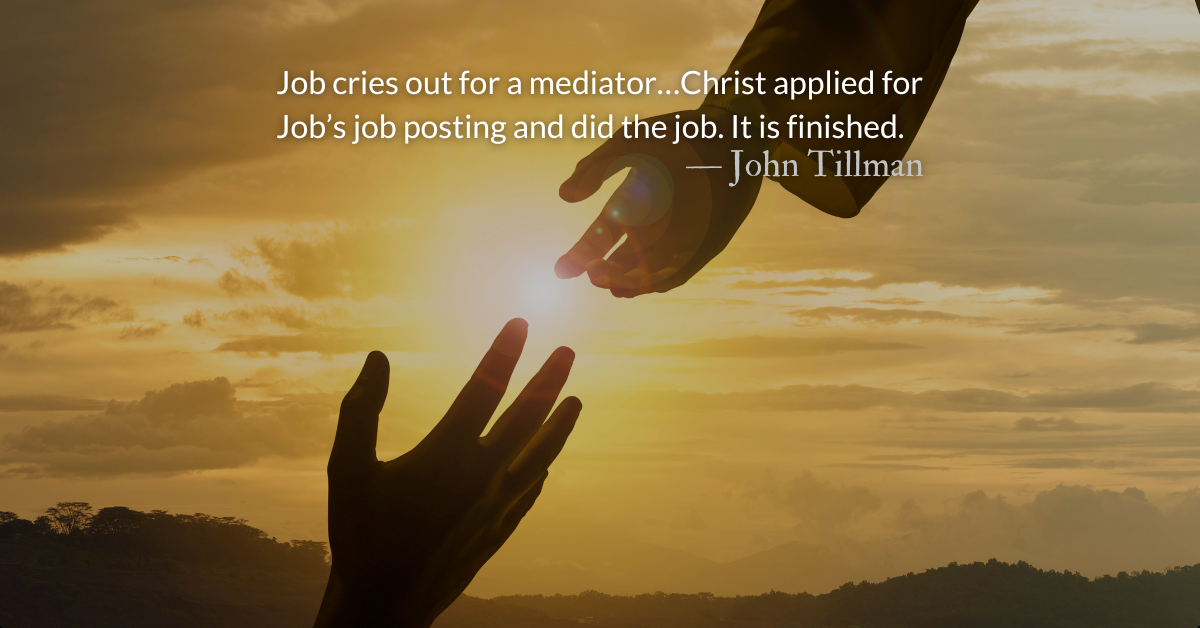Scripture Focus: Job 8.32-35
32 “He is not a mere mortal like me that I might answer him,
that we might confront each other in court.
33 If only there were someone to mediate between us,
someone to bring us together,
34 someone to remove God’s rod from me,
so that his terror would frighten me no more.
35 Then I would speak up without fear of him,
but as it now stands with me, I cannot.
Reflection: Christ, Our “If Only…”
By John Tillman
Job cries out for a mediator.
Job speaks with expansive, idiomatic imagery, recognizing an uncrossable gap between himself and his creator. God could no more come down than we could go up, and if God did step down…mountains would melt seas would flee…making Job’s problems inconsequential.
Job had no illusions that he could actually speak to God. He only asked, “If only…”
If only, he would hear me…
If only I could face him…
If only he could hear my case…
If only I could stand in his presence…
If only there was a mediator…
If only there was a go-between…
If only there was a redeemer…
In the context of the beliefs of his age, Job’s request was foolish, impossible, and inappropriate. To propose God lower himself to address Job was unthinkable. Even as great a man as Job was reported to be, this was considered to be a prideful and sinful desire. Job’s friends, who, out of love, sat in the dust with him for days without speaking, considered this a scandalous bit of madness. This is why Job’s friends seem so harsh to us, so callous. Job is asking not only for the impossible but for the inappropriate.
But thank God that he is the God who abandons propriety to run to us. God’s love for us is foolishly, scandalously undeserved. He is the God who does the unthinkable on behalf of the unworthy.
God is a God for whom there is no uncrossable gap. He crosses the distance to us. God does not step foot on Earth to melt mountains but to melt hardened hearts, turning them back to God. God told Moses he was the Israelites’ “I am.” Christ holds out his hands to Jerusalem, Job, us, and all humanity, longing to be our “If only…”
Jesus did not wade into humanity, timidly cringing at the grossness of flesh, but rejoicing in living among us. He joyfully ate our fish, paid our taxes, touched the diseased, and spoke to (and raised) the dead.
Christ is our mediator if we let him. He stands between us and God. He removed God’s rod from us and placed it on his own back. He will remove our terror of God and allow us to perfectly see God’s tender mercies.
Christ applied for Job’s job posting and did the job. It is finished.
Divine Hours Prayer: A Reading
From the sermon of St. Paul to the people of Antioch: “To keep his promise, God has raised up for Israel one of David’s descendants, Jesus, as Savior, whose coming was heralded by John when he proclaimed the baptism of repentance for the whole people of Israel. Before John ended his course he said, ‘I am not the one you imagine me to be; there is someone coming after me whose sandal I am not fit to undo.’ My brothers, sons of Abraham’s race, and all you godfearers, this message of salvation is meant for you.” — Acts 13.23-36
– From The Divine Hours: Prayers for Summertime by Phyllis Tickle.
Today’s Readings
Job 9 (Listen 3:22)
John 9 (Listen 4:56)
Read more about Greater Footstool, Greater God, Greater Redeemer
As Job begins, Satan walks the Earth and has power over it. Before Job ends, he declares the promise that the Redeemer will stand upon the Earth to reclaim it.
Listen to Pause To Read!
The 2nd full episode of our podcast is out. Have you listened yet? New episodes will come out weekly for a limited time! Please listen, rate the episodes, and share with others to help the show grow.








